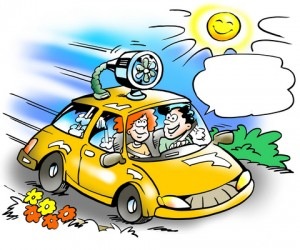 It’s hot outside. When you open your car door after it’s been sitting in the parking lot you’re hit with a blast of heat that seems hotter than an oven .
It’s hot outside. When you open your car door after it’s been sitting in the parking lot you’re hit with a blast of heat that seems hotter than an oven .
The Temperature Rises Quickly Inside A Car
The temperature rises quickly inside a closed car — even when it’s only moderately warm outside.
A study found that at 9AM when the outside temperature was 82 degrees, the temperature inside a closed car was 109 degrees. At 1:30PM, when the outside temperature rose to 112 degrees, the temperature inside a closed car reached 124 degrees.
Cracking the windows helped, but only a very little bit. With four windows cracked, at 10AM, when the temperature was 88 degrees outside, inside the car it was 103 degrees. At 2PM, when the outside temperature rose to 110 degrees, the internal temperature rose to 123 degrees. Certainly not safe conditions for living creatures, especially kids and dogs both of whom are particularly vulnerable to extreme heat.
What About The Food You Just Bought?
Extreme heat is certainly not a safe environment for fresh and prepared food, either. Pity the poor groceries you just bought. They’re sitting in extremely hot temperatures in the back of your car. Staples and boxed food may be fine, but meat, dairy, cut food like fresh fruit, and prepared foods — not a good situation. Why?
When you give bacteria the conditions they like: warmth, moisture, and nutrients, they’ll grow. A single bacterium that divides every half hour can result in 17 million offspring in 12 hours.
The food you just bought might spoil because bacteria present in the food have multiplied like rabbits while it sits in your car in hot, conditions ideal for food spoilage. Perishable food can stay safely unrefrigerated only for two hours if the air temperature is under 90 degrees – and only for one hour if the temperature is 90 degrees or higher.
What Can You Do To Protect Yourself And Your Family?
Be aware of the type of food you are buying. If you have perishable items, take steps to protect yourself and your family:
- Think about your route and how many errands you have to do. Think about stopping at the cleaners or for coffee before grocery shopping — not afterward while your groceries are baking in the car.
- Make wise market choices. When it’s hot outside, take your perishable items straight home. If you know you can’t go straight home take steps to keep your purchases cool – or buy food that doesn’t need refrigeration.
- To be on the safe side, think about keeping a cooler, cold packs, or insulated bags in your car for perishable items. Make sure the cooler hasn’t turned into a portable oven because it’s been sitting in the car for so long.
- Buy a bag of ice if you need to for keeping cold stuff cold and frozen stuff frozen on the way home. Or, bring some frozen gel packs with you.
- Keep in mind that in the winter your car might be colder than your refrigerator. Then there’s no problem stopping for coffee on the way home!



